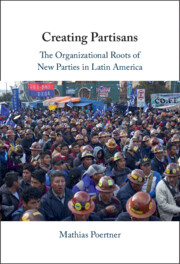
- Publisher:
- Cambridge University Press
- Online publication date:
- December 2024
- Print publication year:
- 2024
- Online ISBN:
- 9781009446327

Why are some new political parties successful at creating mass partisanship and engendering stable electoral support, while most fail to take root in society and disappear quickly? Creating Partisans unveils the secrets behind successful political parties, taking a deep dive into the formation and success of new political parties in Latin America. Based on extensive fieldwork and using a multi-method approach, the book explores how different mobilization strategies sway voters to support new parties. While prior studies have focused on the various types of direct appeals parties make to voters, Creating Partisans reveals that it is organizationally mediated appeals – those that engage voters through locally-based civil society organizations – that can secure electoral support more effectively and can create lasting partisan attachments. From indigenous organizations to informal sector unions, new types of societal organizations play a critical mediating role in shaping electoral outcomes and fostering long-term partisan loyalties in young democracies.
‘How do some new parties gain support and endure? This innovative and rigorous analysis argues that, surprisingly, civil society organizations reassure and guide voters, communicating party messages, persuading potential voters, and building lasting partisan attachments. An indispensable book for scholars of party politics and representation.’
Anna Grzymala-Busse - Michelle and Kevin Douglas Professor of International Studies, Stanford University
‘Run-of-the-mill research on political parties pays too little attention to the hard work of setting up and sustaining electorally successful political parties by creating strong bonds between voters and politicians. This book makes a major contribution to fill that void and explain how new parties can become electorally successful if they build organizational capacities that tie them to the communities from which they draw their voters. It develops an innovative theoretical argument focusing on the infrastructure of local civic associations as critical catalysts to familiarize voters with and connect them to new political parties. Such associational ties build durable party identification in the electorate, thereby improving the upstarts’ prospects of lasting electoral viability. The book employs state-of-the-art empirical research designs and data generation techniques to identify the role of civic associations and their ties to emerging parties as causally consequential for the electoral careers of the new party competitors.’
Herbert Kitschelt - George V. Allen Distinguished Professor of International Relations, Duke University
‘As political parties weaken across the world, identifying viable paths to party-building has become an essential task. Creating Partisans does precisely that. Challenging the widely held view that strong partisan attachments are a thing of the past, the book makes a compelling case that robust mass parties can still emerge - if they are linked to societal organizations. Drawing on impressive research in Bolivia, Ecuador, and Mexico, Poertner shows how indigenous, neighborhood-based, informal workers and other civil society organizations help new parties cultivate durable voter attachments, much as trade unions did in the past. And through careful historical institutionalist analysis, he identifies the conditions under which strong party-organizational ties emerge. Creating Partisans is one of the most important books on Latin American party-building published in the twenty-first century. Anyone interested in the fate of contemporary political parties should read it.’
Steven Levitsky - David Rockefeller Professor of Latin American Studies and Professor of Government, Harvard University
‘How do new parties engender mass support? Received wisdom, including theories of childhood partisan socialization, cannot tell us the answer. Poertner develops a rich and highly convincing account of the effectiveness of voter appeals that are mediated by societal organizations. Leveraging comparative case studies of new parties in Bolivia, Ecuador, and Mexico, and highly original survey and natural experiments, Poertner provides striking new answers to a critical question for democratic politics.’
Thad Dunning - Robson Professor of Political Science, University of California, Berkeley
 Loading metrics...
Loading metrics...
* Views captured on Cambridge Core between #date#. This data will be updated every 24 hours.
Usage data cannot currently be displayed.